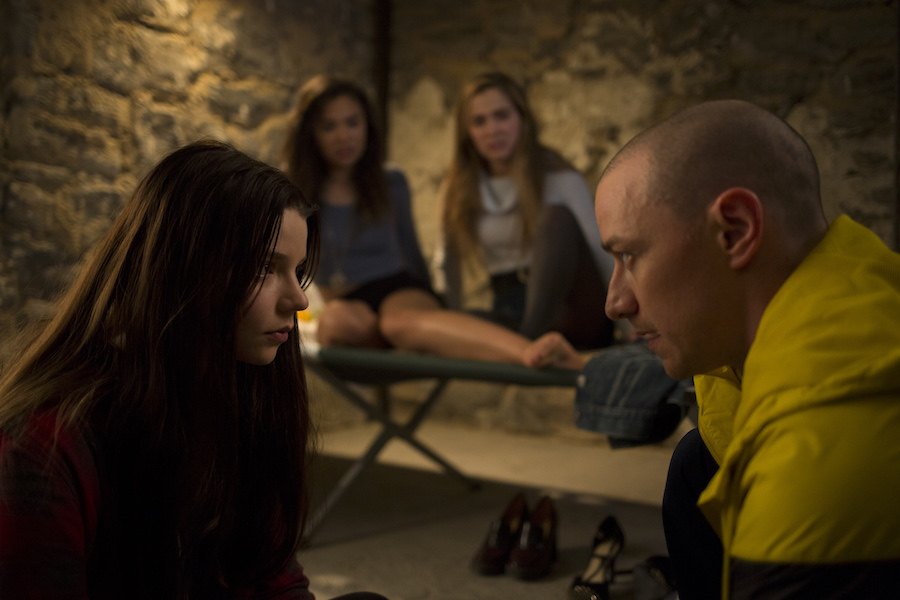‘Split’ Despite what you (or he) might think, M. Night Shyamalan is not a twist guy. He’s also not the second coming of Spielberg. He’s barely even a populist. He may think he’s all three (though it’s been 13 years, i.e., “The Village,” since he’s given us a bona-fide, 11th-hour rug-pulling). But his attempts at mimicry — at pretending he’s the new Hitchcock, the guy who plays audiences like a piano — fail in interesting ways. Even when the films are dogs — unless they’re “The Last Airbender,” his Great Dane-sized poop-fest — Shyamalan makes ambitious, even “arty” numbers that wind up using genre tropes like breadcrumbs, leading us to more emotional, and in some cases deeply troubling places. So it goes with “Split.” The set-up promises a lean, mean killing machine: Three high school girls are chloroformed by a shaved-head meanie (James McAvoy), awakening, “10 Cloverfield Lane”-style, in a dank, windowless room. Their captor is named Kevin, though that’s only one of his 23 personalities. There’s Dennis, the OCD jailer; Patricia, a prim English woman issuing threats as though she were taking afternoon tea requests; Barry, the hepped-up artist; and Hedwig, a pre-teen who dances to rap and crushes on Anya Taylor-Joy’s Casey, the most prominent and least sociable captive. The multiple McAvoys promise no immediate harm, but they do keep alluding to “The Beast,” a coming mystery menace to which they may or may not be sacrificed. RELATED: Interview: Anya Taylor-Joy on “Split” and becoming besties with her directors On its face, this is cusp-of-offensive trash, exploiting fears and ignorance of mental illness for frights while putting comely young lasses in harm’s way. (And what to make of a middle-aged male director stripping his female leads of their clothes after failed escape plans?) Why “Split” winds up only arguably risible is this: Shyamalan is nothing if not empathetic. He’s among our most sincere filmmakers, to the point of inviting ridicule (and not always undeservingly). He loves long, hushed close-ups of quivering faces, corny dialogue, stylized (and often stiff) performances and naked explorations of pain, grief and faith. He does more than let McAvoy do a bravura one-man show a la Eric Bogosian. Each of Kevin’s iterations reveal themselves to be tragic figures — people forced to share one body, convinced salvation will only come through the destruction of others. In other words, this is no mere midnight movie. Shyamalan couldn’t make one of those to save his life. He ruins the claustrophobia early and often by trudging outside, introducing Kevin’s maternal shrink (Betty Buckley) and peppering the story with initially inexplicable flashbacks to the younger Cory, seen preyed upon by a pedo uncle. But Shyamalan’s playing a long con. The Buckley business underlines how earnest he is about seeing Kevin as more than a monster. The flashbacks, meanwhile, reveal the film to be an escape-the-room thriller crossed with Cronenbergian body horror that’s really about the lingering effects of the trauma haunting Casey and her captor. It’s still a rickety thing, “Split” — clumsily paced, overly long and with a dumb twist replaced by a groaning bumper, which comes close to negating all the good will it had laboriously shored up. Despite Shyamalan’s careful attention to detail — he remains a whiz with using off-screen or background space to frazzle nerves — it’s usually the actors who knock it out of the park for him. That’s a hard thing to do; just watch Mark Wahlberg’s hilariously amateur hour wide-eyed turn in “The Happening.” When the actors get the alchemy right, you get Haley Joel Osment in “The Sixth Sense.” Or you get Anya Taylor-Joy in “Split.” McAvoy may have the flashier role, and he nails it, but it’s his female co-lead who steals the show. She’s able, like Osment, to transcend her director’s sometimes overly-studied style, beaming deep, fragile humanity and intelligence, all while doing very little. If Shyamalan knows nothing else, it’s the power a close-up wields to make things all better, even if just for a spell.
Director: M. Night Shyamalan
Stars: James McAvoy, Anya Taylor-Joy
Rating: R
3 (out of 5) Globes
‘Split’ is Shyamalan’s thoughtful version of a midnight movie

Universal Pictures
Follow Matt Prigge on Twitter @mattprigge























